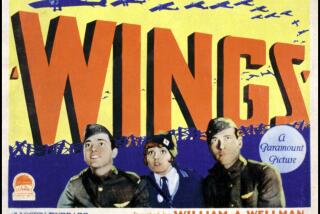Oscars: ’12 Years A Slave,’ the best-picture winner that can’t win?
Even in the to-and-fro over the best-picture race between “12 Years A Slave” and “Gravity” -- a din that has uncharacteristically grown louder in the five days since Oscar voting closed -- there’s been almost no talk of another issue. Namely, what if the Steve McQueen slavery drama takes best picture but little else?
What if the film, nominated for nine Oscars, wins just two other statuettes (supporting actress for Lupita Nyong’o and adapted screenplay for John Ridley -- pretty much the best-case scenario given the field), or one other (a reasonable possibility), or none at all (remote but still possible)?
“Gravity” is poised to win a slew of prizes: cinematography and visual effects and sound mixing and production design, and almost certainly Alfonso Cuaron for best director. If it wins best picture too, it will continue a tradition for many modern Oscar best-picture winners of at least five overall wins. Many movies, of course, have notched more — “Slumdog Millionaire,” for example, received eight Oscars, “The Last Emperor” got nine, and “Titanic” pulled in 11. But “12 Years” could be the best-picture winner whose name presenters barely utter until the show’s final five minutes (the same scenario, incidentally, that played out at the Golden Globes).
The least-decorated best-picture winner in the last 35 years is “Crash,” which won screenplay and editing and, well, that’s pretty much it. “Rocky” also took just three back in 1976. (Most of the best-picture winners that nabbed fewer than that came in the first half of the 20th century, such as “All Quiet on the Western Front,” which won just one other in 1930, and “Mutiny on the Bounty,” which won no others in 1935.)
There’s a technical reason why this might happen again with “12 Years.” For many years the reason so many movies swept through other categories was simple: The best-picture winner was chosen from only five nominees, which meant that a film needed a larger base of support to win, which translated to love in other categories. With the current system spreading best-picture love among as many as nine or 10 nominees, a movie can take the prize with fewer votes, which means it may not necessarily be as dominant in other categories.
But there’s something else that a “12 Years” near-shutout could shed light on, something a bit more philosophical -- namely, what makes a best-picture winner? Can a movie be tops in nearly no individual categories and yet be the best of the year? Can it be better than the sum of its parts? Is it possible --forgive the figure-skating overtones -- that a film is the second- or third-best in all its component elements but still considered to have given the best overall performance of the year?
PHOTOS: See Glenn Whipp’s 2014 Oscar picks | See pundits’ Oscar 2014 picks
On its face the answer would appear to be no, but a movie like “12 Years” may triumph for a different reason. Technical achievements and acting achievements and all those other achievements are nice, but some movies transcend that -- some movies whose subject matter, whose import, whose willingness to take on certain subjects at certain times, and to do so skillfully, trumps any particular nomination-worthy achievement.
It is here that the “Gravity” vs. “12 Years” race has echoes of another hot Oscar contest, the one in 2006, where “Brokeback Mountain” drew many of the accolades and serious essays but was nonetheless thwarted on Oscar night by a mainstream Hollywood entertainment, “Crash.”
The debate surrounding “Brokeback” was similar to the one you’ve heard about “12 Years” in the last few months. Is America ready? Will more conservative academy members commit to watching it? Could they embrace what they saw if they did? And indeed, though “Brokeback” won many run-up prizes, Oscar voters ultimately went for the candy-coated accessibility of “Crash.” Hollywood voters couldn’t handle the difficult, nuanced realities of “Brokeback Mountain,” the wisdom goes, so they opted for one they could get their heads around. “Crash,” in other words, played the “Gravity” role.
In a way, though, as much as cineastes don’t like to hear it, “Crash” actually had a lot more in common with “12 Years” than that comparison suggests. It dealt with race, of course, but more important it was race that made voters go for it -- even if they didn’t actually think it was the best film in all the categories that usually go into a best-picture calculation. “Crash” was not seen as the superior choice in very many categories but that didn’t matter. It was Hollywood saying that the movie raised important questions and how we — or at least the upper-middle class voters who comprise the academy — feel about them, and that was enough. Put another way, it was time.
There will be a little navel-gazing Monday if “12 Years” wins and a lot of navel-gazing if it doesn’t. Whether a fair extrapolation or not, America will either be very ready or very not ready for a conversation about race. And a few thousand Hollywood insiders will be the ones dictating how it’s conducted. In that respect, only one award matters.
ALSO:
Oscars: For many, ’12 Years A Slave’ is too hard to watch
‘12 Years A Slave’ wins big at Film Independent Spirit awards
Oscars 2014: Jennifer Lawrence and the name game
Twitter: @ZeitchikLAT
More to Read
Only good movies
Get the Indie Focus newsletter, Mark Olsen's weekly guide to the world of cinema.
You may occasionally receive promotional content from the Los Angeles Times.







